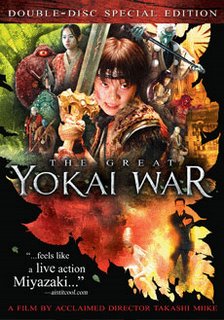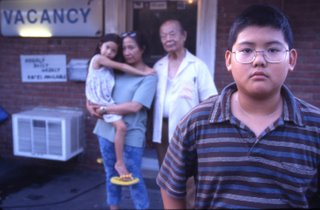
I was ahead of the curve regarding the popularity of Asian cinema Stateside. Just a month or two before I relocated to Hong Kong in 1988, Film Comment published an extensive article about Hong Kong cinema, which I took with me on my trip and used as a kind of guide. Thanks to the affinity HK genre cinema shares with its US counterpart (and, of course, to subtitles) understanding the films was no problem, but getting in to see them was sometimes a different story. "You want English movie, not Chinese movie," the ticket-taker would say, as I explained that I wanted to see the local CHINESE GHOST STORY III as opposed to the American GHOST, which was playing at the same cinema. No one could figure out why a Caucasian might be interested in the Cantonese-language product, and at the time, there weren't many who were. So impressed was I with John Woo's BULLET IN THE HEAD I actually called him at his office, which had a listed telephone number, and told him how much I liked the movie, which he was not getting much love for. "Umm, thanks...English not so good, but much thanks," he said. Made my day to do that.
In time, Woo would learn to speak better English as he moved to Hollywood, and the American audience got the hang of Cantonese-language cinema. I kept up. San Jose, my next port of call, had occasional HK and Asian film festivals (is the Towne theater still there, I wonder?) and a wonderful video store, run by a sweet old Chinese lady who stocked every title, some of dubious bootleg origin. [Also an astonishing variety of porn.]
By the time I reached New York, in 1995, HK cinema was on a definite upswing, thanks to the popularity of Jackie Chan's RUMBLE IN THE BRONX (the one with snowcapped Vancouver mountains in the background of "the Bronx") and an influx of HK talent to our shores. Chinatown still had its own movie theaters, like the Music Palace and the Rosemary, but I must admit I preferred the relative luxury of Cinema Village and its HK festivals to those smelly, rundown, moth-eaten joints. Now that they've been gone for several years I feel a twinge of nostalgia for them, which is preferable to the twinge of pain I felt in my rear end and lower back from their broken seat springs.
But Cinema Village stopped showing HK films, as the market went into a steep decline pre- and post the 1997 handover to China. The only place to see them, reliably, were the Chinatown video stores, but I'm not into blind buying of DVDs. I fell behind.
Fortunately, those crazy kids at Subway Cinema came to the rescue. Having failed to make the Music Palace a cinema cause celebre for local movie fans (a lost, if valiant, cause; the springs...I can feel...the...springs...) they started their own film festival, which kicks off its fifth anniversary edition tomorrow night. But, with HK movies having reasserted themselves to some degree (last year's award-winning triad drama ELECTION, from director Johnnie To, is superb), the New York Asian Film Festival concentrates instead on the weird and the wild from countries like Japan and Korea, movies highly unlikely to be selected for Best Foreign Language Film consideration by the Oscars, much less any kind of US release.
A couple of weeks ago the guys (who you get to know a little if you go to enough of their presentations, as I have, along with 8,000-10,000 other film geeks in the region) invited me to the ImaginAsia Theater on East 59th Street to catch a screening of one of this year's films, THE GREAT YOKAI WAR. This is an attempt by Japan's Takashi Miike, of the masterful horror film AUDITION and the gangster splatterfest ICHI THE KILLER, to crash the family film market after a series of duds (he makes films like the rest of us make dinner, and last year's output included an episode of Showtime's MASTERS OF HORROR show the network deemed too hot to handle, odd, given their showcasing of his other entrails-ripping movies).
Clearly, "family-friendly" means something different there than it does here. In the US, you get wise-cracking, digitally animated cars; in Japan, you get rubbery monsters with elongated appendages and umbrellas for heads, and a villainess who is the spitting image of Paris Hilton. It was a hectic two hours, like the entire LORD OF THE RINGS cycle boiled into a single, demented feature. I've decided that, by and large, I prefer my Japanese monsters large and reptilian--the last fest's showcase of GODZILLA FINAL WARS was an absolute riot--but driven by Miike's cracked sense of the absurd I enjoyed this new YOKAI more than the 1968 film on which it's based, and it's quintessentially Subway. [If you miss it, and you really should see it with an audience, it hits DVD on July 11.]
[Kudos, besides, to the ImaginAsia, which took a backwater cinema on its way to the fate of the Rosemary (and so many other theaters in its own backyard--the Beekman, the Sutton, the East Side Playhouse, etc., etc.) and gave it new vitality and purpose with its own Asian programming, which recently included the excellent Chinese feature MOUNTAIN PATROL and a CGI monster mash from Japan, NEGADON. Some new bars and restaurants have also popped up along that stretch of Second and Third Avenue, which is home to several lighting manufacturers and used to bustle, as much as it ever did, with the sound of Roosevelt Island tram commuters, who have been left to the tender mercies of the F train after its recent breakdown.]

It just so happens that today I attended a Film Forum screening of an upcoming feature, THE MOTEL (Palm Pictures, opens June 28), which is bowing there after a warm reception at Sundance. Developed at Sundance, it has a very Sundance ending--mysteriously, not all that convincingly, open-hearted after a lot of caustically funny exchanges between a put-upon Chinese-American woman (Jade Wu) who runs a hot-sheet motel somewhere in Westchester County and her chubby 13-year-old son (Jeffrey Chyau), who falls under the HUD-like influence of one of her boarders, a Korean-American (the charismatic Sung Kang, who stars in the new FAST AND THE FURIOUS installment) working his way through the local hookers. But the writer-director, Michael Kang, has a feel for life on the margins and the clumsiness of adolescence, and it's good to see the Asian and the Asian American finding a place on the Manhattan movie scene.
[Photo credits: YOKAI, Media Blasters; THE MOTEL, Palm Pictures]


No comments:
Post a Comment